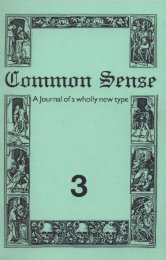i on thomas paine reviews: origins of crisis in ussr - Common Sense
i on thomas paine reviews: origins of crisis in ussr - Common Sense
i on thomas paine reviews: origins of crisis in ussr - Common Sense
You also want an ePaper? Increase the reach of your titles
YUMPU automatically turns print PDFs into web optimized ePapers that Google loves.
Triul by Space: Reflecti<strong>on</strong>s <strong>on</strong> Lefehvre Puge 23<br />
c<strong>on</strong>cepts can be carried to a higher level and would benefit by tak<strong>in</strong>g full account <strong>of</strong> space,<br />
it is also argued here that Lefebvre's approach does appear to displace the central core <strong>of</strong><br />
Marx's theory and that, c<strong>on</strong>trq to Lefebvre. Marx's expositi<strong>on</strong> still holds.<br />
F<strong>in</strong>ally, Lefebvre rejects Mm's (and Hegel's) method as this "was based <strong>on</strong> an analysis <strong>of</strong><br />
historical time" (1991 p331) but today the problematic is that <strong>of</strong> space. 'To recognise<br />
space, to recognise what 'takes place' there and what it is used for, is to resume the<br />
dialectic", but "it is no l<strong>on</strong>ger Marx's dialectic, just as Marx's was no l<strong>on</strong>ger<br />
Hegel's .... The dialectic today no l<strong>on</strong>ger cl<strong>in</strong>gs to historicity and historical time." (1976 pp<br />
17, 14) In other words, while the Hegelian dialectic displaced historical time <strong>in</strong> favour <strong>of</strong><br />
the fetishisati<strong>on</strong> <strong>of</strong> space <strong>in</strong> the service <strong>of</strong> the state, Mm's "<strong>in</strong>versi<strong>on</strong>" <strong>of</strong> this dialectic,<br />
accord<strong>in</strong>g to Lefebvre, not <strong>on</strong>ly marked a denial <strong>of</strong> idealism but also a rejecti<strong>on</strong> <strong>of</strong> space <strong>in</strong><br />
favour <strong>of</strong> a "vigorous re<strong>in</strong>statement <strong>of</strong> historical time as revoluti<strong>on</strong>ary time." (1991 p21)<br />
For Lefebvre the Marxian dialectic <strong>of</strong>fers a limited perspective because "there are spatial<br />
c<strong>on</strong>tradicti<strong>on</strong>s which imply and expla<strong>in</strong> c<strong>on</strong>tradicti<strong>on</strong>s <strong>in</strong> historical time, though without<br />
be<strong>in</strong>g reducible to them." (ibid.) The old dialectic is therefore no l<strong>on</strong>ger appropriate for<br />
grasp<strong>in</strong>g modem society and must liberate itself from time. 'The dialectic thus emerges<br />
from time and actualises itself, operat<strong>in</strong>g now, <strong>in</strong> an unforeseen manner, <strong>in</strong> space." (1991<br />
p 128) This aspect <strong>of</strong> Lefebvre's work will be returned to below, but it is argued here that<br />
the dialectic never went away and that Marx's was not a dialectic <strong>of</strong> time, but <strong>of</strong> the<br />
presence <strong>of</strong> labour <strong>in</strong> capital. The result <strong>of</strong> Lefebvre's particular read<strong>in</strong>g <strong>of</strong> Marx is that<br />
Marx is sentenced to historical time and Lefebvre to wander <strong>in</strong> space. Therefore, while<br />
Lefebvre provides many stimulat<strong>in</strong>g and thought provok<strong>in</strong>g <strong>in</strong>sights, it is never quite clear<br />
what his theory <strong>of</strong> space is nor how or why his history <strong>of</strong> space changes from <strong>on</strong>e form to<br />
another.<br />
On the producti<strong>on</strong> <strong>of</strong> space<br />
Hav<strong>in</strong>g found Marxism want<strong>in</strong>g, Lefebvre turns to develop his theory <strong>of</strong> space. This<br />
theory, the producti<strong>on</strong> <strong>of</strong> space, is important to Lefebvre as it directly addresses both the<br />
basis and functi<strong>on</strong><strong>in</strong>g <strong>of</strong> social reality and therefore answers a fundamental, yet neglected<br />
questi<strong>on</strong> with<strong>in</strong> social theory: "what is the mode <strong>of</strong> existence <strong>of</strong> social relati<strong>on</strong>s?" (1991<br />
p401) Lefebvre's answer is that "social relati<strong>on</strong>s, which are c<strong>on</strong>crete abstracti<strong>on</strong>s, have no<br />
real existence save <strong>in</strong> and through space. Their underp<strong>in</strong>n<strong>in</strong>g is spatial. In each<br />
particular case, the c<strong>on</strong>necti<strong>on</strong> between this underp<strong>in</strong>n<strong>in</strong>g and the relati<strong>on</strong>s it supports calls<br />
for analysis." (1991 p404) This emphasis <strong>on</strong> space by Lefebvre, however, tends to<br />
<strong>in</strong>troduce a dualism which haunts his expositi<strong>on</strong>: social relati<strong>on</strong>s appear to be aspatial and<br />
are somehow c<strong>on</strong>nected to an asocial space as underp<strong>in</strong>n<strong>in</strong>g! Accord<strong>in</strong>g to Lefebvre, the<br />
analysis <strong>in</strong>volved must imply and expla<strong>in</strong> a genesis and also c<strong>on</strong>stitute a critique <strong>of</strong> the<br />
social forms (such as capitalism or feudalism) that have transformed the space under<br />
c<strong>on</strong>siderati<strong>on</strong>. This emphasis <strong>on</strong> genesis and critique is important as it means that the<br />
knowledge sought is not directed at space itself, nor does it c<strong>on</strong>struct models, typologies<br />
or prototypes <strong>of</strong> space; rather, it <strong>of</strong>fers "an expositi<strong>on</strong> <strong>of</strong> the producti<strong>on</strong> <strong>of</strong> space" <strong>in</strong> which<br />
the critical moment - ie. a critique <strong>of</strong> established knowledge - is the essential th<strong>in</strong>g. (ibid.)<br />
"Knowledge <strong>of</strong> space so understood implies the critique <strong>of</strong> space." (1991 p 405)<br />
Lefebvre starts by reject<strong>in</strong>g the dom<strong>in</strong>ant philosophical and scientific "c<strong>on</strong>cepti<strong>on</strong>s" <strong>of</strong><br />
space <strong>in</strong> order to develop a "critical knowledge" <strong>of</strong> space, <strong>on</strong>e which overcomes the<br />
separati<strong>on</strong> <strong>of</strong> c<strong>on</strong>cept and reality and which is therefore based <strong>on</strong> the c<strong>on</strong>cept and reality <strong>of</strong>



